Cyclist
The Tour, the French and storming the Bastille: July 14th at the Tour de France
Sunday marks France’s national holiday, Bastille Day. This is no reference to the beige-sounding English pop band of the same name – Bastille Day memorialises the day Paris’s Bastille prison was stormed by the masses on 14th July 1789 in an attempt to liberate political prisoners.
Given the Tour’s takeover on French roads, Bastille Day offers a chance for extra eyes to be on the race as the French public take a day off to celebrate scarves in summertime, extended lunch breaks and a long tradition of crusty bread. In all seriousness, Bastille Day – known as quatorze juillet or la fête nationale in French – is a pretty big deal in France.
At the 2024 Tour de France, the peloton will celebrate quatorze juillet on the slopes of Plateau de Beille on Stage 15. As we dig out the tricolores, let’s cast our minds back on the history of Bastille Day – old and recent – at the Tour de France.
Home-grown success
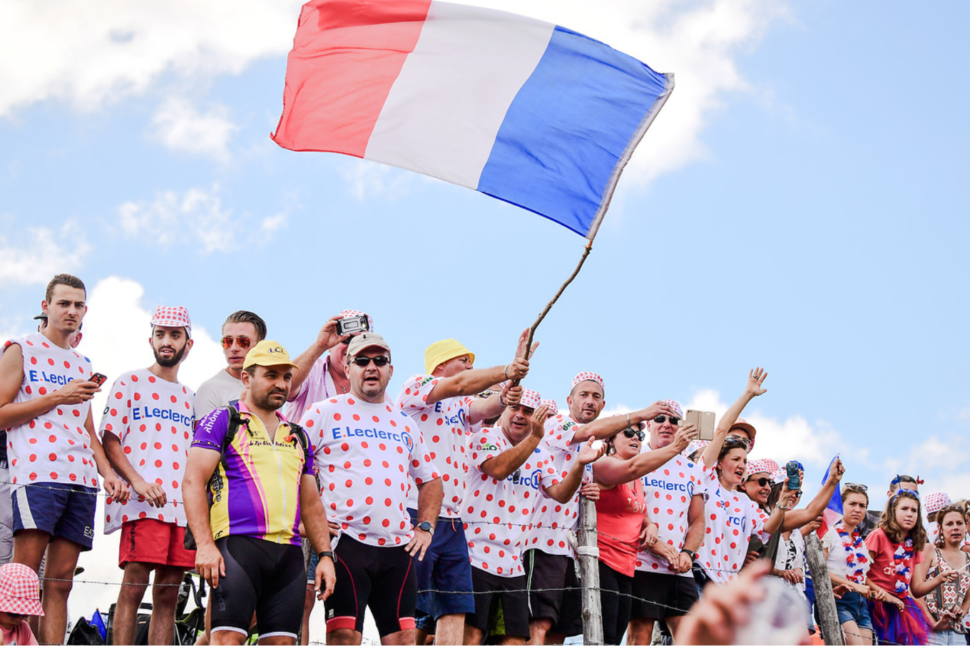
Over the years the French have pushed themselves to honour their nation on the yellow-clad roads of France, resulting in 32 stage wins (as of the time of writing). In the past two decades, however, only three French riders have won on Bastille Day: Warren Barguil (2017), David Moncoutié (2005) and Richard Virenque (2004).
For French riders, there’s no bigger stage on the Tour than 14th July.
However, since 2013, Ineos Grenadiers have won 40% of stages on Bastille Day, including wins from Tom Pidcock and Chris Froome. The British team have become very familiar at raining on France’s parade.
Warren Barguil’s national anthem (2017)
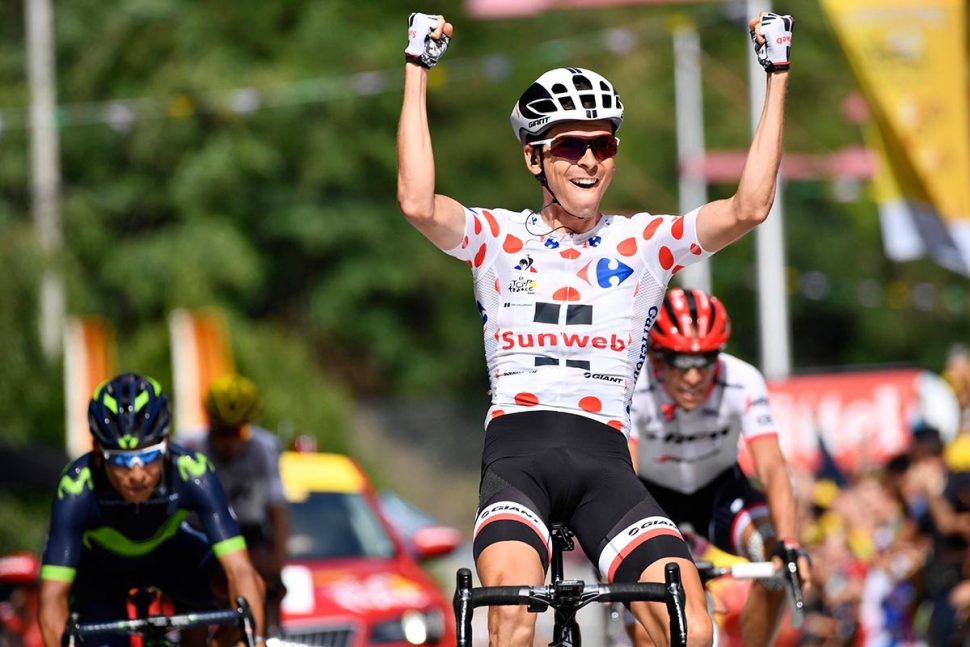
The Bastille Day stage of the 2017 edition was one that would act as an experiment for the Tour. A noticeably short stage through the Pyrenees acted as a full-on day-long yellow jersey battle that saw its bearer, Fabio Aru, fight for his race leadership role.
Alberto Contador and Mikel Landa tried a couple of fliers, but a reduced group at the end would be left to battle it out for the win in Foix. After hunting mountain points all day, it was down to Warren Barguil to bear the expectations of a nation.
In the end, Barguil delivered a flawless sprint to take the stage win sporting the polka-dot jersey. The victory on Bastille Day was the perfect remedy and vindication following a near miss on Stage 9 that year.
To this date, Barguil is the last French rider to win on Bastille Day.
Tony Gallopin ‘honours the jersey‘ (2014)
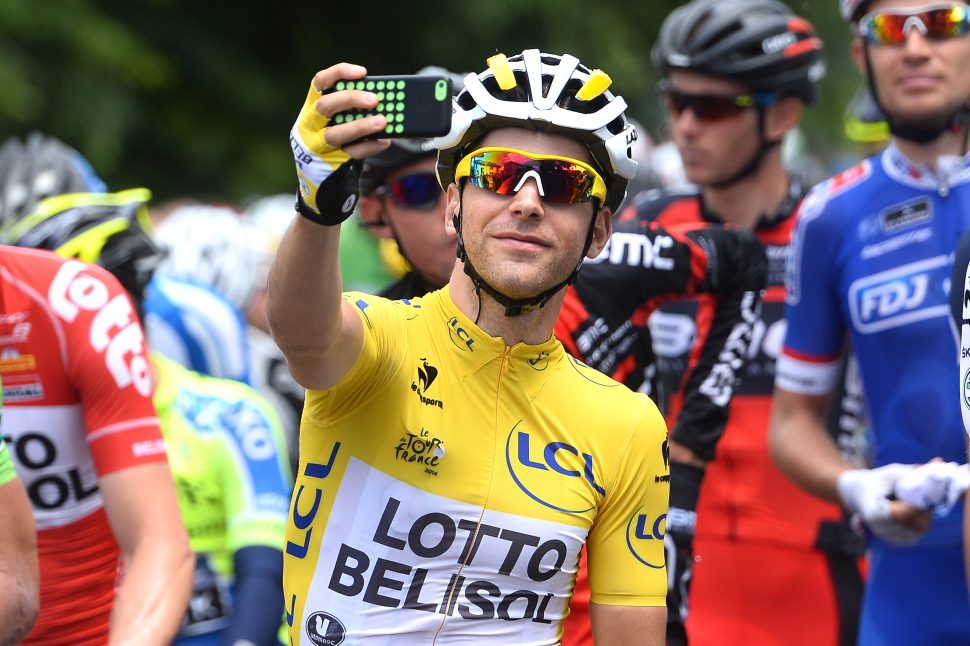
On the eve of la fête nationale, an unexpected turn of events on the previous day in the Vosges Mountains brought Tony Gallopin into the yellow jersey. Almost dazed in shock, Gallopin, a self-declared puncheur, came into Bastille Day hoping to show off the yellow jersey in all its splendour.
After battling through the stage valiantly, it seemed to be a bridge too far for Gallopin who was dropped on the foot of the final climb of the day, La Planche des Belles Filles. A flurry of long-distance attacks from heavy hitters like Michał Kwiatkowski and Joaquim Rodríguez set the scene for what was Vincenzo Nibali’s takeover of the yellow jersey from the hands of the grimacing Frenchman Gallopin who sat almost five minutes down the road.
Despite the outcome, Gallopin’s sole day in the maillot jaune will go down as a special one, and cemented his place in the Tour de France cycling psyche for years to come.
Jalabert sparks French optimism (1995)
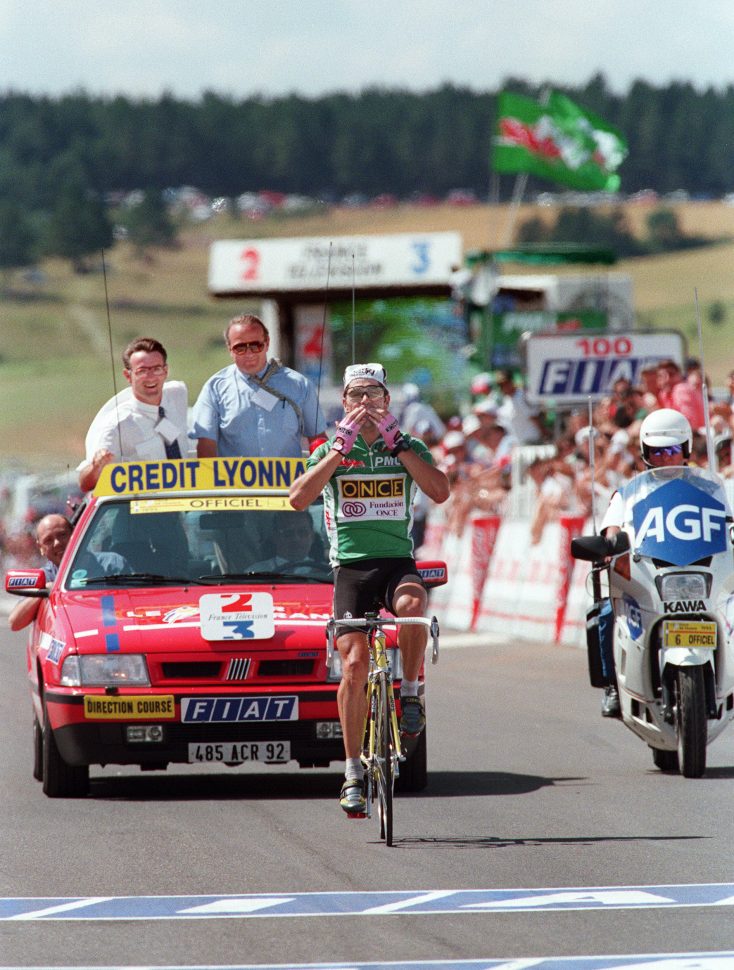
In one of his most fiery Tours, Frenchman Laurent Jalabert ignited the 1995 race on a rolling stage in the bowels of the French state. As a natural on the steep gradients and Classics-style climbs, Jalabert rolled the dice and went for a long-range move, placing pressure on his GC competitors behind. Although Jalabert had never contended for the yellow jersey before, he declared his intent on this day by extinguishing Miguel Induráin and his Banesto team.
On the Côte de la Croix Neuve, the final challenge on the way to Mende, Jalabert dropped all of his courageous breakaway group to ride solo into the final straight. Commentators and the French press were left overwhelmed by the green jersey wearer’s exploits on this stage, leading them to believe that he could challenge for a podium position. In a post-race interview, Jalabert, a native of southern France, compared his win to the popular French film La Grande Vadrouille. It’s a niche reference but appreciated nonetheless.
To honour of Jalabert’s Bastille Day exploits the local tourism board has renamed the Côte de la Croix Neuve the Montée Jalabert.
Bernard Thévenet shifts the paradigm (1975)
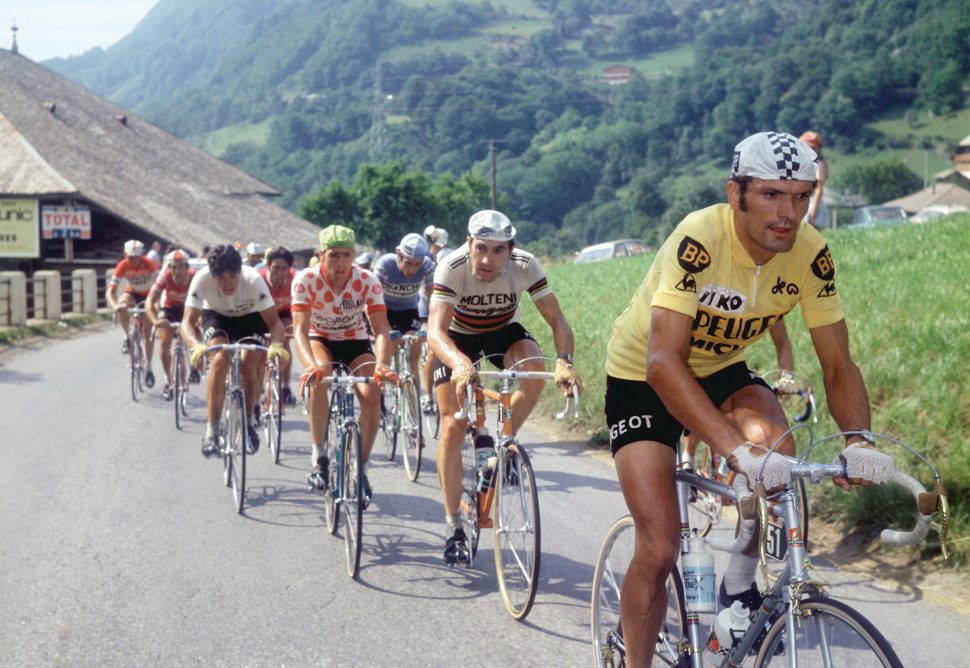
By the time the 1975 Tour de France came around, the era of Eddy Merckx was still in full swing. However, after years of utter dominance, the French press and cycling community had fallen out of love with The Cannibal who was assumed to be on course to win his sixth Tour de France victory. As the race developed Merckx shook off every challenger for the maillot jaune bar one, Peugeot’s Bernard Thévenet.
The day before 14 juillet saw Thévenet take a momentous win at the summit of Pra-Loup, claiming the maillot jaune in the process. Whilst the sport prepared itself for the Frenchman to waver on the 16th stage, Thévenet took the opportunity to make Bastille Day the day where he would place the final nail in the coffin of the Merckx dynasty.
As he rode away to a two-minute lead over the Alpine passes, the race leader made no effort to leave anything to chance as he delivered a ride that would guarantee his place on the top spot of the podium. The Tour would soon come to realise that this would be the last time Merckx would seriously contend the hallowed leaders’ jersey, making this a monumental ‘changing of the guard’.
The maillot jaune and Bastille Day
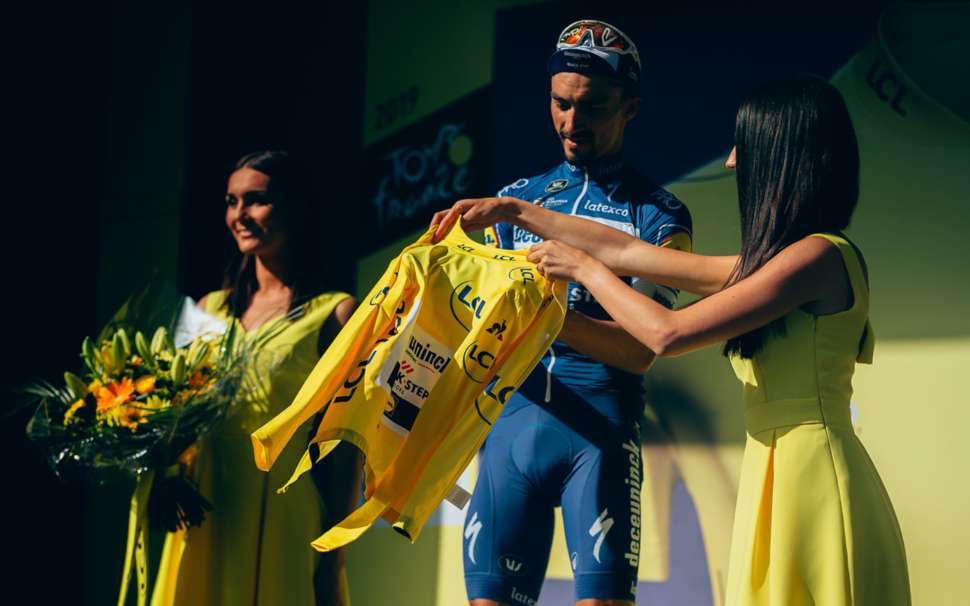
Since the pandemic forced a later Tour de France and therefore no Bastille Day stage in 2020, every race leader after Bastille Day has gone on to win the race overall in Paris. The last Frenchman to wear the yellow jersey was Julian Alaphilippe back in 2019.
Often, the 14th July stage would serve up a brutal and pivotal profile. As a consequence, Bastille Day would see some of the Tour’s most era-defining moments for the French and for the Tour.
In recent years, it has been about foreigners more than the French on Bastille Day.
Thou who shall not be named (2003)
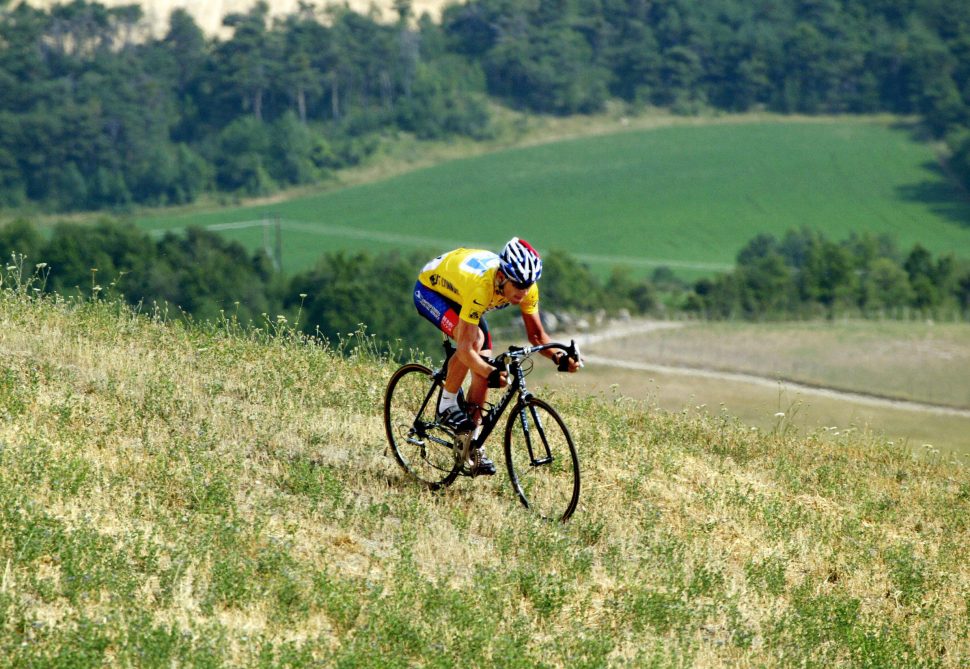
The 2003 Tour de France promised to be special. The edition celebrated the 100 year anniversary since the first Tour de France, thus, making it a bumper edition filled with pits and falls in the parcours and the GC.
Stage 9 that year coincided with Bastille Day, just before the race’s first rest day. At the start of the day, the ever-disgraced Lance Armstrong enjoyed a slim 40-second lead over Basque contender Joseba Beloki of the ONCE squad.
On the descent of the Col de Manse, the two were inseparable. As the race weaved its way down the descent, the Basque rider’s wheel locked up on the melting Alpine roads. Armstrong, who was vigilant in the wheels, dived into a nearby field to avoid the crash. As the Texan negotiated the bumps and haybales, he had saved the chances of another tainted Tour de France victory. At the time, hero status was warranted to Armstrong for this cyclocross-style instinct.
Alexander Vinokourov, the current Astana team director and saviour of Mark Cavendish, would claim the stage win in Gap. Talk, however, was all about Armstrong’s heroics on the descent, and the uncertain future of Tour challenger Joseba Beloki at that year’s Tour. With the crash, Beloki would fall down the standings, opening up a chasm between Armstrong and other GC contenders.
Sky high (2013)

In the centenary Tour de France, Chris Froome’s Team Sky had dominated like they had the year prior. By this point, British breakthroughs in the sport had become more and more familiar but, instead of Bradley Wiggins before him, this time Froome was starting to stride away from the field.
For the 100th Tour’s Bastille Day celebrations, the race took on Mont Ventoux. On the climb, a plucky Nairo Quintana looked to have the measure of race leader, Chris Froome. For a country that had never seen Tour glory before, Quintana’s determination on Mont Ventoux was an exciting prospect. However, despite Quintana’s genetic aptitude in the mountains, the lanky Brit would have the last laugh. A characteristic wiry attack with a handful of kilometres to go allowed Froome some space to breathe.
As Froome crossed the finish line, he pointed to the sky having sealed a second stage win at the 2013 Tour de France. With this stage victory, the spectre of Froome’s dominance settled on the Tour de France. On Bastille Day, the peloton became prisoners of a new tyrant. His name, Chris Froome.
Froome gets some steps in (2016)

Stage 12 of the 2016 Tour was supposed to be the first mountain showdown for a pack tightly placed in terms of the GC time gaps. With the prospect of Mont Ventoux up ahead, this was bound to be one to tell the kids about. In reality, high winds shortened the stage, forcing it to finish further down the slopes of the ‘Giant of Provence’ at the less glamorous destination of Chalet Reynard. However, this stage would become an instant classic for all the wrong reasons.
Instead of a fatigue-driven Greek tragedy, a comedy of errors ensued. A motorbike crash in the final kilometres forced Richie Porte, Bauke Mollema and Froome onto the smouldering concrete of the Provençal mountain.
Amongst the chaos, all eyes were transfixed by images of the yellow jersey running up one of cycling’s most mythical climbs. Once he crossed the line, on a borrowed bike, there was an indescribable tension. A dark cloud of questions and debates arose, even before Froome regained his yellow Pinarello. On quatorze juillet, Froome took storming the Bastille a little too literally.
The boy prince becomes the king (2021)
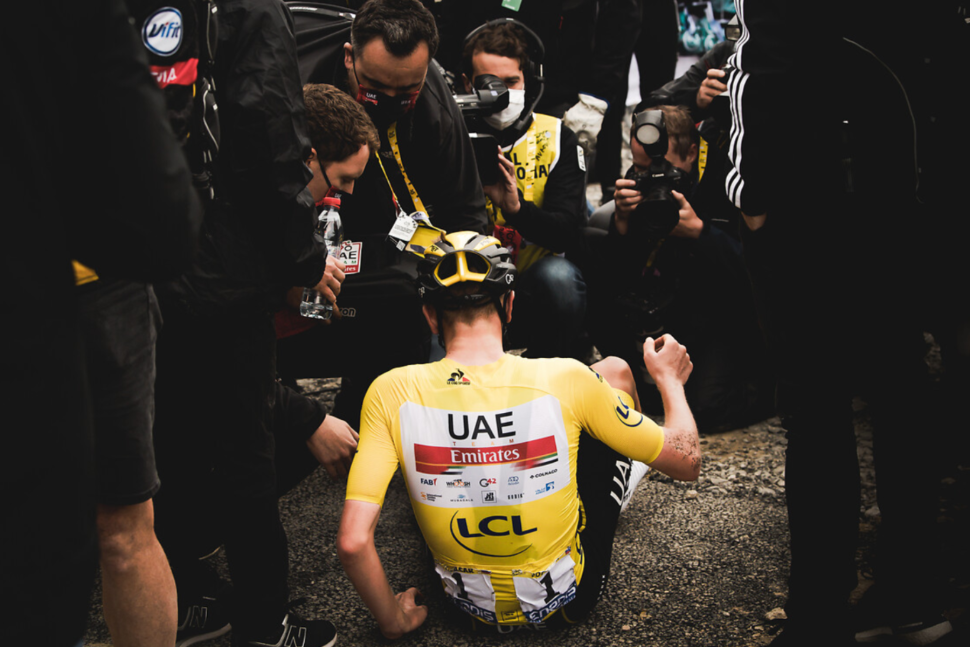
In his sophomore Tour, Tadej Pogačar seemed unstoppable. After a siege on the slopes of La Planche des Belles Filles the year prior, the Slovenian was in need of proving his ‘once-in-a-generation status’.
Anthony Perez and David Gaudu provided a hurrah for the French fans in the breakaway. However, UAE Team Emirates were steadfast in bringing the race together for the final climb up to the Col du Portet, a climb in excess of 2000m in altitude.
Podium contenders Jonas Vingegaard and Richard Carapaz rolled the dice in an attempt to rattle the yellow jersey. Pogačar seemed unphased by their attempts to unhook him. As the riders crested the final slopes of the Pyrenean climb, Pogačar danced out the pedals and grit his teeth for the first time on the ascent, distancing the others in only a few pedal revolutions.
It was never in question. Pogačar had won fair and square in the mountains against a new field of protagonists, including his future rival Vingegaard. Tadej was more than a ‘one-Tour-wonder’, he was here to stay. On this day, the boy prince became the king.
Winners on Bastille Day in the last 50 years
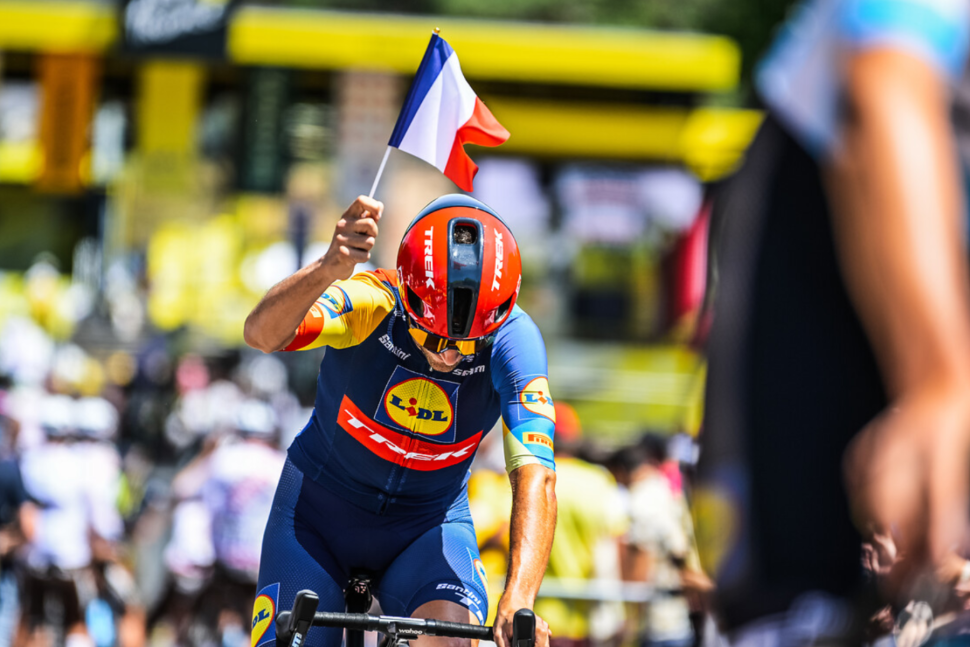
- 2023: Michał Kwiatkowski
- 2022: Tom Pidcock
- 2021: Tadej Pogačar
- 2020: No race on Bastille Day
- 2019: Daryl Impey
- 2018: Dylan Groenewegen
- 2017: Warren Barguil
- 2016: Thomas De Gendt
- 2015: Chris Froome
- 2014: Tony Martin
- 2013: Chris Froome
- 2012: André Greipel
- 2011: Samuel Sánchez
- 2010: Sérgio Paulinho
- 2009: Mark Cavendish
- 2008: Juan José Cobo
- 2007: Linus Gerdemann
- 2006: Yaroslav Popovych
- 2005: David Moncoutié
- 2004: Richard Virenque
- 2003: Alexander Vinokourov
- 2002: Karsten Kroon
- 2001: Laurent Jalabert
- 2000: José Vicente Garcia
- 1999: Giuseppe Guerini
- 1998: Jens Heppner
- 1997: Laurent Brochard
- 1996: Djamolidine Abdoujaparov
- 1995: Laurent Jalabert
- 1994: Rest day on Bastille Day
- 1993: Tony Rominger
- 1992: Jean-Paul van Poppel
- 1991: Mauro Ribeiro
- 1990: Eduardo Chozas
- 1989: Vincent Barteau
- 1988: Steven Rooks
- 1987: Dag Otto Lauritzen
- 1986: Rudy Dhaenens
- 1985: Eduardo Chozas
- 1984: Rest day on Bastille Day
- 1983: Henk Lubberding
- 1982: Gerrie Knetemann
- 1981: Peter Winnen
- 1980: Mariano Martínez
- 1979: Rest day on Bastille Day
- 1978: Paul Wellens
- 1977: Rest day on Bastille Day
- 1976: Freddie Maertens & Gerben Karstens
- 1975: Bernard Thévenet
- 1974: Eddy Merckx
French riders are noted in italics.
The post The Tour, the French and storming the Bastille: July 14th at the Tour de France appeared first on Cyclist.
















